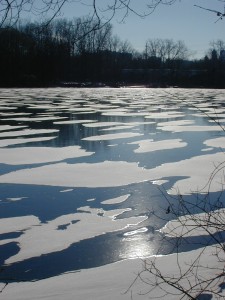
Here we are in mid-January, and the ground has yet to freeze this winter and the snowfall measures a scant few inches. This week’s forecast continues the pattern of the past several weeks with a few days below freezing interspersed with 40+ degree F days. It seems the comments that I hear from others fall into either the “so pleased not to be shoveling” camp or the “yep, it’s climate change, alright” camp. In my house, these camps are represented along with the increasingly high-pitched “when can we go sledding?!” kids camp.
Is the weather thus far this winter related to changing climate trends? Difficult to say since the difference between weather and climate is a measure of time. Weather is what conditions of the atmosphere are over a short period of time, and climate is how the atmosphere “behaves” over relatively long periods of time. We’re not the only ones wondering. Our friends at River Network also blogged recently about the weather weirdness with an eye on the western states.
For some perspective, we have the benefit of working with the Great Lakes Integrated Sciences and Assessments (GLISA) Center, the NOAA-funded collaboration between the University of Michigan and Michigan State University. At the December kickoff of HRWC’s year-long project to assess climate adaptation needs for key sectors in the watershed, I invited Dr. Jeff Andresen, state climatologist and GLISA faculty, to share his insights on climate trends in Michigan.
While I suggest you spend some time on the GLISA website for the context and explanation of the data, here’s a summary of Jeff’s main points (emphases mine):
- Overall, mean average temperatures in Michigan rose approximately 1.0ºF during the past century. Warming of about 2.0ºF has occurred between 1980 and the present, much of it concentrated during the winter season and at night
- Milder winter temperatures have led to less ice cover on the Great Lakes and the seasonal spring warm-up is occurring earlier than in the past
- Annual precipitation rates increased from the 1930s through the 1990s but have leveled off recently
- Most recent Global Circulation Model simulations of the Great Lakes region suggest a warmer and wetter climate in the distant future, with much of the additional precipitation coming during the cold season months
- Projections of future climate change in Michigan suggest a mix of beneficial and adverse impacts
- A changing climate leads to many potential challenges for dependent human and natural systems, especially with respect to climate variability
In the coming months, we will engage our partners in watershed communities involved in infrastructure, in-stream flows, and natural resources decisions to discuss what type of climate resources they need most to incorporate climate adaptation into decision making.



